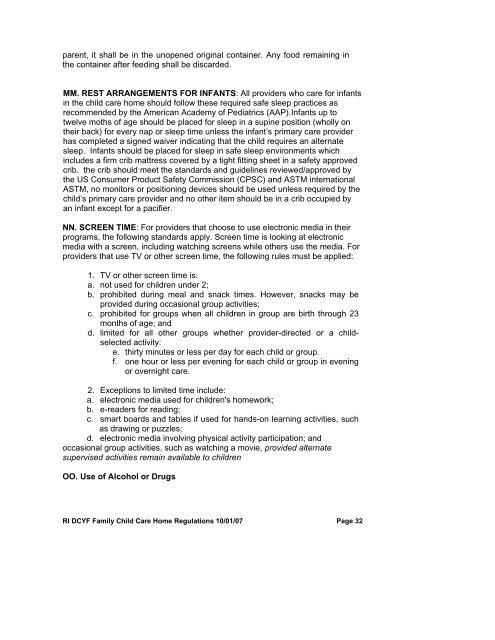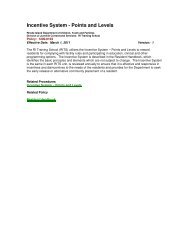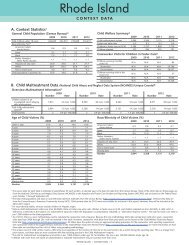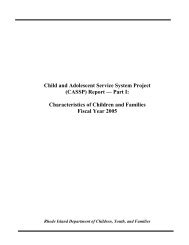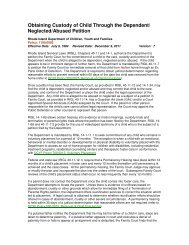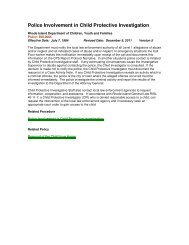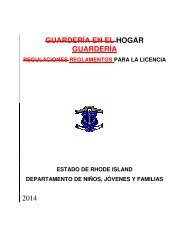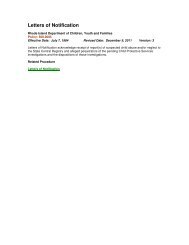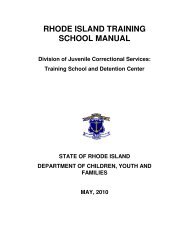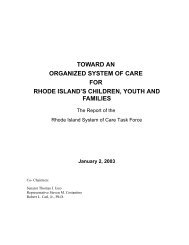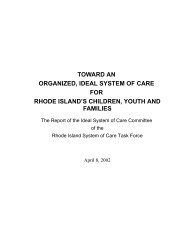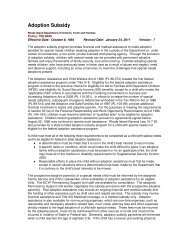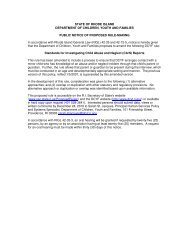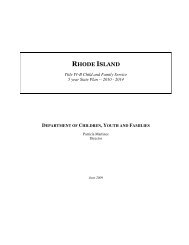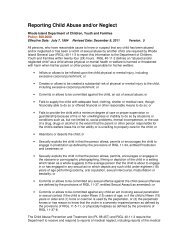Family Child Care Home Regulations for Licensure - RI Department ...
Family Child Care Home Regulations for Licensure - RI Department ...
Family Child Care Home Regulations for Licensure - RI Department ...
Create successful ePaper yourself
Turn your PDF publications into a flip-book with our unique Google optimized e-Paper software.
parent, it shall be in the unopened original container. Any food remaining in<br />
the container after feeding shall be discarded.<br />
MM. REST ARRANGEMENTS FOR INFANTS: All providers who care <strong>for</strong> infants<br />
in the child care home should follow these required safe sleep practices as<br />
recommended by the American Academy of Pediatrics (AAP).Infants up to<br />
twelve moths of age should be placed <strong>for</strong> sleep in a supine position (wholly on<br />
their back) <strong>for</strong> every nap or sleep time unless the infant’s primary care provider<br />
has completed a signed waiver indicating that the child requires an alternate<br />
sleep. Infants should be placed <strong>for</strong> sleep in safe sleep environments which<br />
includes a firm crib mattress covered by a tight fitting sheet in a safety approved<br />
crib. the crib should meet the standards and guidelines reviewed/approved by<br />
the US Consumer Product Safety Commission (CPSC) and ASTM international<br />
ASTM, no monitors or positioning devices should be used unless required by the<br />
child’s primary care provider and no other item should be in a crib occupied by<br />
an infant except <strong>for</strong> a pacifier.<br />
NN. SCREEN TIME: For providers that choose to use electronic media in their<br />
programs, the following standards apply. Screen time is looking at electronic<br />
media with a screen, including watching screens while others use the media. For<br />
providers that use TV or other screen time, the following rules must be applied:<br />
1. TV or other screen time is:<br />
a. not used <strong>for</strong> children under 2;<br />
b. prohibited during meal and snack times. However, snacks may be<br />
provided during occasional group activities;<br />
c. prohibited <strong>for</strong> groups when all children in group are birth through 23<br />
months of age; and<br />
d. limited <strong>for</strong> all other groups whether provider-directed or a childselected<br />
activity:<br />
e. thirty minutes or less per day <strong>for</strong> each child or group.<br />
f. one hour or less per evening <strong>for</strong> each child or group in evening<br />
or overnight care.<br />
2. Exceptions to limited time include:<br />
a. electronic media used <strong>for</strong> children's homework;<br />
b. e-readers <strong>for</strong> reading;<br />
c. smart boards and tables if used <strong>for</strong> hands-on learning activities, such<br />
as drawing or puzzles;<br />
d. electronic media involving physical activity participation; and<br />
occasional group activities, such as watching a movie, provided alternate<br />
supervised activities remain available to children<br />
OO. Use of Alcohol or Drugs<br />
<strong>RI</strong> DCYF <strong>Family</strong> <strong>Child</strong> <strong>Care</strong> <strong>Home</strong> <strong>Regulations</strong> 10/01/07 Page 32


